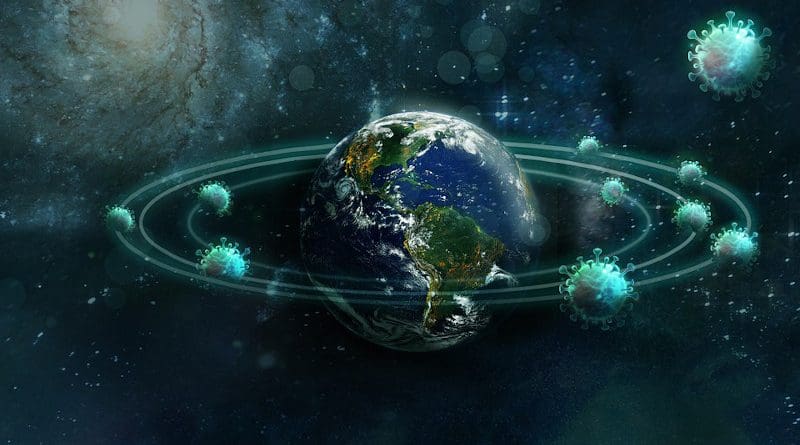Mathew Maavak: The Pandemic Is Aggravating Already Fragile Global Systems – OpEd
By Peter Tase
The ongoing decade is characterized by volatility, uncertainty, complexity and ambiguity (VUCA); these propositions, tenets and concepts are the principal theme of an academic paper written by Mathew Maavak, titled: “Horizon 2030: Will Emerging Risks Unravel Our Global Systems?”
The author makes his case by applying the core pillars of systems thinking to chart out the decade’s trajectory: diminishing diversity of actors; interconnections; interactions; and adaptations in global systems. Risks must no longer be studied in siloes as they are all inextricably intertwined.
In his paper, Maavak emphasizes the thoughts of US economist John Mauldin (2018) who has warned that the “2020s might be the worst decade in US history” and may lead to a Second Great Depression. Maavak argues that ‘Other forecasts are equally alarming. According to the International Institute of Finance, global debt may have surpassed $255 trillion by 2020 (IIF, 2019). Yet another study revealed that global debts and liabilities amounted to a staggering $2.5 quadrillion (Ausman, 2018).” These damages were calculated at a time before the health pandemics of Covid-19.
According to the author: “The IMF singles out widening income inequality as the trigger for the next Great Depression (Georgieva, 2020). The wealthiest 1% now own more than twice as much wealth as 6.9 billion people (Coffey et al, 2020) and this chasm is widening with each passing month. COVID-19 had, in fact, boosted global billionaire wealth to an unprecedented $10.2 trillion by July 2020 (UBS-PWC, 2020). Global GDP, worth $88 trillion in 2019, may have contracted by 5.2% in 2020 (World Bank, 2020).”
In his arguments, Maavak relates to the ancient Greek historian Plutarch who warned in the 1st century AD that an “An imbalance between rich and poor is the oldest and most fatal ailment of all republics”.
Environmental consequences and natural emergencies are other angles from which Maavak’s perspective on the ongoing global crisis has taken shape. In his research he continues:“What happens to the environment when our economies implode? Think of a debt-laden workforce at sensitive nuclear and chemical plants, along with a concomitant surge in industrial accidents? Economic stressors, workforce demoralization and rampant profiteering – rather than manmade climate change – arguably pose the biggest threats to the environment. In a WEF report, Buehler et al (2017) made the following pre-COVID-19 observation:
‘The ILO estimates that the annual cost to the global economy from accidents and work-related diseases alone is a staggering $3 trillion. Moreover, a recent report suggests the world’s 3.2 billion workers are increasingly unwell, with the vast majority facing significant economic insecurity: 77% work in part-time, temporary, “vulnerable” or unpaid jobs.’
Shouldn’t this phenomenon be better categorized as a societal or economic risk rather than an environmental one? In line with the systems thinking approach, however, global risks can no longer be boxed into a taxonomical silo. Frazzled workforces may precipitate another Bhopal (1984), Chernobyl (1986), Deepwater Horizon (2010) or Flint water crisis (2014). These disasters were notably not the result of manmade climate change. Neither was the Fukushima nuclear disaster (2011) nor the Indian Ocean tsunami (2004). Indeed, the combustion of a long-overlooked cargo of 2,750 tonnes of ammonium nitrate nearly leveled the city of Beirut, Lebanon, on August 4, 2020. The explosion left 204 dead; 7,500 injured; US$15 billion in property damages; and an estimated 300,000 people homeless (Urbina, 2020). The environmental costs have yet to be adequately tabulated. Environmental disasters are more attributable to Black Swan events, systems breakdowns and corporate greed rather than to mundane human activity.”
The author has tacked waste management and other environmental hotspots across the Horn of Africa and beyond as he continues to elaborate on some of the most valid and relevant geopolitical issues of today.
“On an equally alarming note, depressed economic conditions have traditionally provided a waste disposal boon for organized crime elements. Throughout 1980s, the Calabria-based ‘Ndrangheta mafia – in collusion with governments in Europe and North America – began to dump radioactive wastes along the coast of Somalia. Reeling from pollution and revenue loss, Somali fisherman eventually resorted to mass piracy (Knaup, 2008).
The coast of Somalia is now a maritime hotspot and exemplifies an entwined form of economic-environmental-geopolitical-societal emergence. In a VUCA world, indiscriminate waste dumping can unexpectedly morph into a Black Hawk Down incident. The laws of unintended consequences are governed by actors, interconnections, interactions and adaptations in a system under study – as outlined in the methodology section.
Environmentally-devastating industrial sabotages – whether by disgruntled workers, industrial competitors, ideological maniacs or terrorist groups – cannot be discounted in a VUCA world. Immiserated societies, in stark defiance of climate change diktats, may resort to dirty coal plants and wood stoves for survival. Interlinked ecosystems, particularly water resources, may be hijacked by nationalist sentiments. The environmental fallouts of critical infrastructure (CI) breakdowns loom like a Sword of Damocles over this decade.”
Besides appearing at Eurasia Review, the research paper was originally published at Salus Journal
Reference
Maavak M. (2021). Horizon 2030: Will Emerging Risks Unravel Our Global Systems? Salus Journal, Volume 9, Number 1, 2021. Publisher: Charles Sturt University, Australia.

